Constantin Coandă
This article needs additional citations for verification. (May 2014) |

Constantin Coandă (1857, Craiova – 1932 Bucharest) was a Romanian soldier and politician. He reached the rank of general in the Romanian Army, and later became a mathematics professor at the National School of Bridges and Roads in Bucharest. Among his seven children was Henri Coandă, the discoverer of the Coandă effect.
During World War I, for a short time (October 24 – November 29, 1918), he was the Prime Minister of Romania and the Foreign Affairs Minister. He participated in the signing of the Treaty of Neuilly between the Allies of World War I and Bulgaria.
During his term as president of the Romanian Senate (representing Alexandru Averescu's People's Party), Coandă was badly wounded on December 8, 1920 by a bomb set up by the terrorist and anarchist Max Goldstein.
References
- 1857 births
- 1932 deaths
- People from Craiova
- Prime Ministers of Romania
- Romanian academics
- Romanian Army World War I generals
- Romanian Land Forces generals
- Romanian Ministers of Foreign Affairs
- Romanian people of World War I
- Members of the Senate of Romania
- Presidents of the Senate of Romania
- People's Party (interwar Romania) politicians
- Romanian military personnel stubs
- Romanian politician stubs


